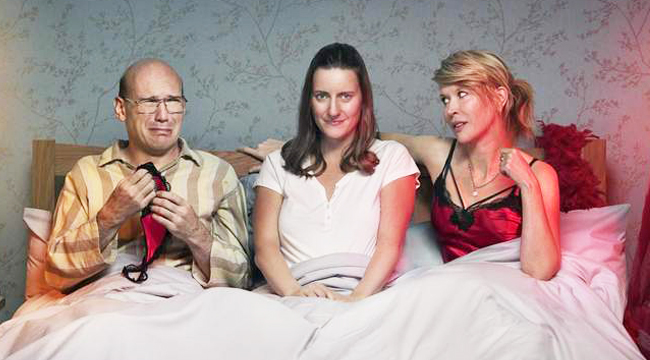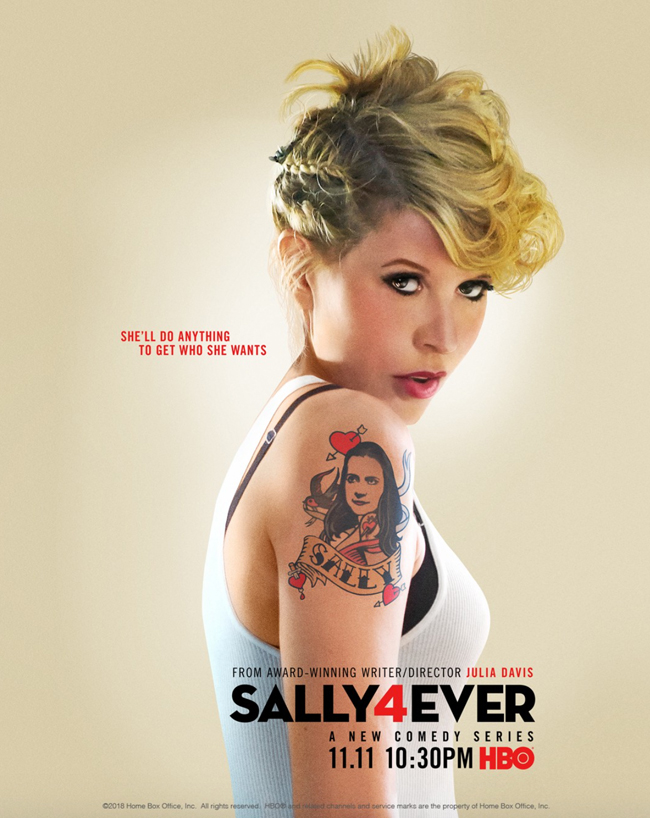
Sally4Ever may be the most unapologetically filthy show of the year. The new HBO series hails from the mind of creator, director, and star Julia Davis, who plays Emma, a bawdy temptress who breaks up a 10-year relationship between the paralyzingly meek Sally (Catherine Shepherd) and her hapless, hopeless boyfriend, David (Alex Macqueen). What follows is a torrid lesbian affair that spirals into obsession, which may sound like the premise for an infidelity-based thriller. Yet the series is actually an outrageously comedic romp about love and sex and the often insidious way in which romance can take over our lives.
Davis, known in England as the reigning queen of dark TV comedy, also created and starred in the original U.K. version of Camping that’s currently being adapted (and toned down) by Girls team Lena Dunham and Jenni Konner for U.S. audiences. Yet Sally4Ever strikes HBO directly from the unrestrained mind of Davis, and the series will make a November 11 debut sure to send many jaws straight to the floor. In typical Davis fashion, no subject is off limits, and the humor takes a visceral turn, including multiple cartoonishly explicit sex scenes, graphic depictions of illness and death, and more. It’s an enormously dark comedy, and Davis (who has also appeared in Black Mirror and Phantom Thread) was gracious enough to chat with us about the series.
You’re known in Britain for your outrageous humor. In the U.S., we have some notorious male TV writers who push the envelope, but my first question after watching Sally4Ever, which is uncompromisingly raunchy, was whether you’re worried about additional backlash as a woman?
A little bit? My feeling is that there are definitely people who won’t like the show, but I would presume that they’d just not tune into it.
In the first few episodes, there are two sex scenes that are more explicit than anything I’ve seen on TV in the U.S. — even by HBO’s own standards — where writers tend to focus more on violence than sex, or sex mixed with elements of violence, both in harder-rated movies and TV.
Yeah, I agree. I also think that in drama, explicit stuff, as you say, violence, seems to be okay. But in comedy, I feel, there’s still a thing that it’s less common to see, and I think some people will be quite shocked by the content.
In addition to being titillating and inspiring laughter, these scenes are astonishing, even if they don’t feel programmed that way. What was your intent in crafting these scenes?
I don’t think I ever sit down to shock people in a deliberate way, just for the hell of it. I do sort of enjoy it and find it funny — kind of an explosion of delight — about images or whatever, but honestly, I was quite inspired by the Blue Is The Warmest Color. I loved the film, I thought it was really sensual and brilliant. I also could see the potential comedy, even just the way they ate … the close-up of them eating spaghetti, the sensuality of it all. But that sort of inspired some images and ideas, and I was also thinking of juxtaposing those sort of things against someone very disapproving while seeing those things. Like, for example, the attitude of [Sally and David’s mothers]. Especially in Britain, thinking of my upbringing, where there was quite a lot of religious judgment and stuff, it’s all kind of churning around [and] where it all probably comes from.
Your character, Emma, is a pathological liar, a gaslighter, and maybe a narcissist or a sociopath. Does she know how awful she is?
I don’t think she knows, and that’s a common thing with characters that I end up playing or writing. It’s like a sociopathic thing, that kind of absolute lack of self-awareness, but also like people I have met in my life who don’t seem to be aware of the impact they’re having on other people or the consequence of their behavior. I find that an interesting type of condition.
I love the scene when Emma pretends to be Stanley Kubrick’s daughter and concocts this fantastic, horrible backstory. How did you settle on Kubrick for that line?
We did a lot of improvising, so to be honest, that came up in the moment, but it feels like the sort of person who she wants to be her father. She truly thinks she could be a great actress.
Sally and David are such exaggerated characters in the first few episodes. Do you think they’re also irredeemable in their own ways?
It’s funny but I genuinely feel great affection for both of those characters, and I think Sally’s very lovable to see as a person who can’t make decisions and is sort of weakened by others. I hope that in the first episode, the mother comes across as critical and leading her daughter to believe that there’s not much to expect in life, so I really don’t see Sally as irredeemable. I don’t see either of them that way, actually, and I hope that becomes clear and pays off by the time you get to episode 7.
Underneath all of the shenanigans, you really highlight how long-term relationships can go stale, and suddenly, people realize that they’re miserable. That appears in your other work as well.
Yeah, that seems to be a recurring theme. It’s a weird thing, but I’m actually probably a romantic at heart, but I’m probably too idealistic and get disillusioned by the world.
You wrote and starred in the original Camping, playing the character now embodied by Juliette Lewis, and the U.S. version gives its characters a sympathetic edge. How does it feel to watch a different spin on your creation?
Well, to be honest, I’ve only seen the first episode, but I love Juliette Lewis. I was very excited by the fact that she would be playing that role, and Bridget Everett [who plays the lesbian campground proprietor]. I think it’s a very interesting take on it all, and I was very excited that Lena Dunham would want to do that. I was intrigued by where she would take it, obviously because of Girls being incredible but also because of her age, thinking what would she do with something that’s an age group that I do know something about and have lived amongst a lot of those type of people who were represented in the English version. So it’s really sort of fascinating to see, but I don’t know where it’s gonna go. I know they’re following some story beats that were in my version, but beyond that, it’s gonna go quite different places.
From what I understand, it’s kind of a note from America that people want more explanations about why people are badly behaved? Whereas [in the UK], we just put them on the screen and say, “This is what we do.” I don’t think we give any reasons for that kind of behavior.
The jokes in this series are so dark and sometimes come out of nowhere, like the really visceral outcome with the meal containing gluten, which could offend some people. Where did that joke come from?
Well, my father passed away last year suffered from celiac disease, and he was always very humorous about his condition. So there’s a whole mix of these things from my family going on there and why those jokes are in there. I tend to think not really of who I’m going to offend. I think if I had to sit down and write with a lot of people around me, I would write absolutely nothing.
‘Sally4Ever’ debuts on November 11 at 10:30pm EST on HBO.







